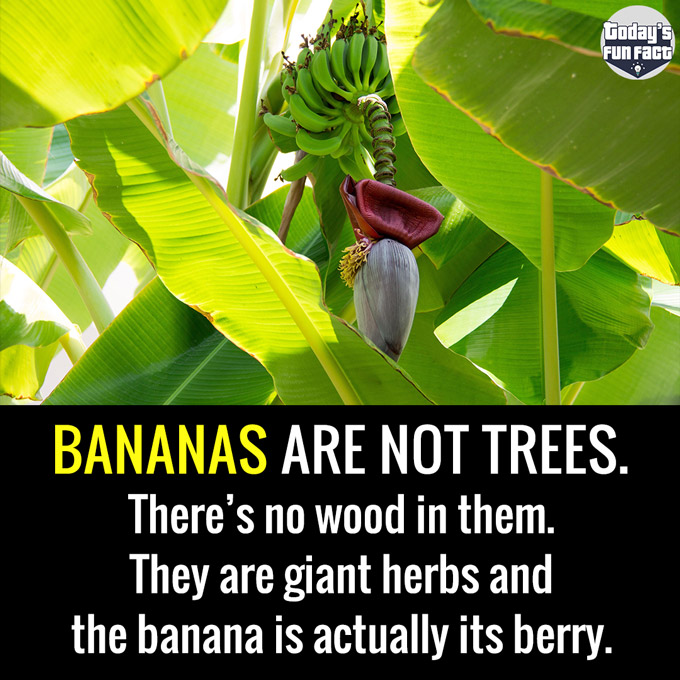
Bananas Are Not Trees Graphic © todaysfunfact.com. Background photo: Pixabay (PD)
Banana tree – Banana herb. Which of the two sounds right? If you said “banana tree,” think again. According to the botanical definition, what most people call a banana tree is an herb. But that’s not the only curve ball. The delicious tropical we love chopping into our salads and smoothies is technically a berry!
Bananas join a club of oddball plants that continue to confound people, along with dandelions (herbs not weeds), avocados (berries not drupes), and tomatoes (berries not vegetables).
No Wood In Bananas
The thought of a herb brings visual images of rosemary, parsley, or basil. But you might want to add the banana plant to your mental library because, in the botanical sense, it is a herb. Why?
Well, first of all, it’s not a tree. Trees are defined by their woody trunk—and we can assure you there is not a sliver of wood in a banana stem.
Instead, a banana has a succulent stalk that shoots from an underground rhizome. If this sounds remotely similar to ginger, that’s because the two plants are distant relatives.
A single stalk grows upwards, wrapped in lead sheaths, before popping out as a large fruit-bearing bud. The stalk dies after fruiting, with new shoots (still part of the one rhizome) emerging from the base of the old stalk. This process can go on for decades.
Bananas Are Berries, But Raspberries And Strawberries Aren’t
Botanists define fruits based on the part of the ovary/flower that gives rise to their flesh, seeds, and skin. Sub-categories within the fruit family include pomes (apples), stonefruits (apricots), berry (banana), and citrus (lemon).
Berries are as simple as they come. They stem from one flower and ovary, and usually have several seeds. They also have a fleshy middle and soft skin. Bananas tick all the boxes perfectly, making them a quintessential fruit despite common assumptions.
If you have your eyebrows lowered trying to picture seeds in the last banana you ate, they’re just so tiny most people forget they’re there.
There you have it. Next time you go bananas for bananas, you’ll have some fun facts to think about or share with someone!
